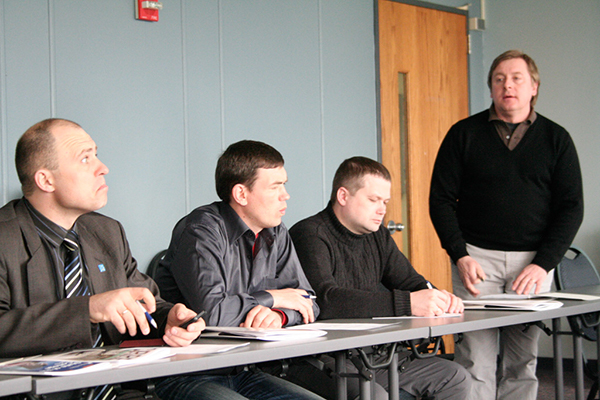

Despite the chaos currently surrounding Ukraine, three mayors from the country took a seven-day trip to the Hudson Valley to get an up-close look at Western-style democracy.
As part of their tour, the mayors visited SUNY New Paltz to learn about the American Federal System and engage in discussions with political science students of the college.
In attendance were three delegates from Ukraine, all scheduled to come to New York long before military and political events unraveled in their country.
Serhiy Buleha, the Head of Kitsman City Council, described his home in western Ukraine as an agricultural region with a small population of 10,000 people.
Oleksandr Korinnyy, part of the Executive Committee of Novourayinsk City Council, described his central Ukraine home as predominantly agricultural with some food processing industry and a population of roughly 20,000 people.
Lastly was Oleh Onutse, the First Deputy Head of Kalanchatska Village Council, who said his southern Ukrainian home had around 10,000 people as well.
The three officials spoke to those in attendance at the college through their translator, Olha Tykhonova, the Communications Manager for LBM Engineering.
Their trip to the local area was coordinated through The Friendship Force of the Hudson Valley and the Open World Program, both of which promote international relations with overseas allies. The event in New Paltz was just one stop in the three delegates visit to the area which included stops in Goshen, Newburgh, Beacon, Montgomery, Hyde Park and New York City.
“Seeing the freedom your local citizens and local governance have is something Ukrainians have to strive for in the future,” Buleha said.
The Ukrainian delegates were brought to New Paltz to learn about the New York political system specifically from a sub-national perspective, according to Kathleen Dowley, a professor in the political science and international relations department.
“We very rarely get a look at politics beneath the national level,” she said. “It’s a unique opportunity to take a look at what’s going on on the ground level, not just in the capital city.”
Center for Research, Regional Education and Outreach Director Gerald Benjamin agreed with Dowley about the importance of getting a smaller localized government point-of-view.
“Diplomats from national governments and international organizations do high diplomacy, but they don’t talk about the water system, the sewer systems, the roads; things like that,” he said.
Originally there were five mayors scheduled to come to New York from Ukraine, but two could not attend, one of which was from the Crimea peninsula, according to Interim Associate Director of CRREO, Robin Jacobowitz.
Despite this, Jacobowitz said she thought the visiting mayors presented a unique opportunity to speak to people from Ukraine and to hear their account of the country’s current circumstances.
The three mayors addressed the Crimean conflict during the question and answer portion of the evening.
Onutse said his town is being greatly affected by events unfolding in Crimea, as it is close to the region.
“The banks are not working in Crimea … no electricity… there is a shortage of food,” he said. “We see people living in vacation areas in Crimea come and raid our grocery stores for our products.”
Buleha said he was disappointed by the West’s weak response and wished more specific actions were taken against Russia.
“Europe kept silent over the invasion of Austria… and as a result, Hitler had taken over half the world,” he said.
When asked if the delegates had a fear of military action in their towns, Buleha again responded.
“Of course we are fearful,” Buleha said. “Not for the transition itself, but for Russians bringing in more troops. We are very hopeful Russia will not make another mistake, because this can mean war if Russians start moving into the mainland.”
